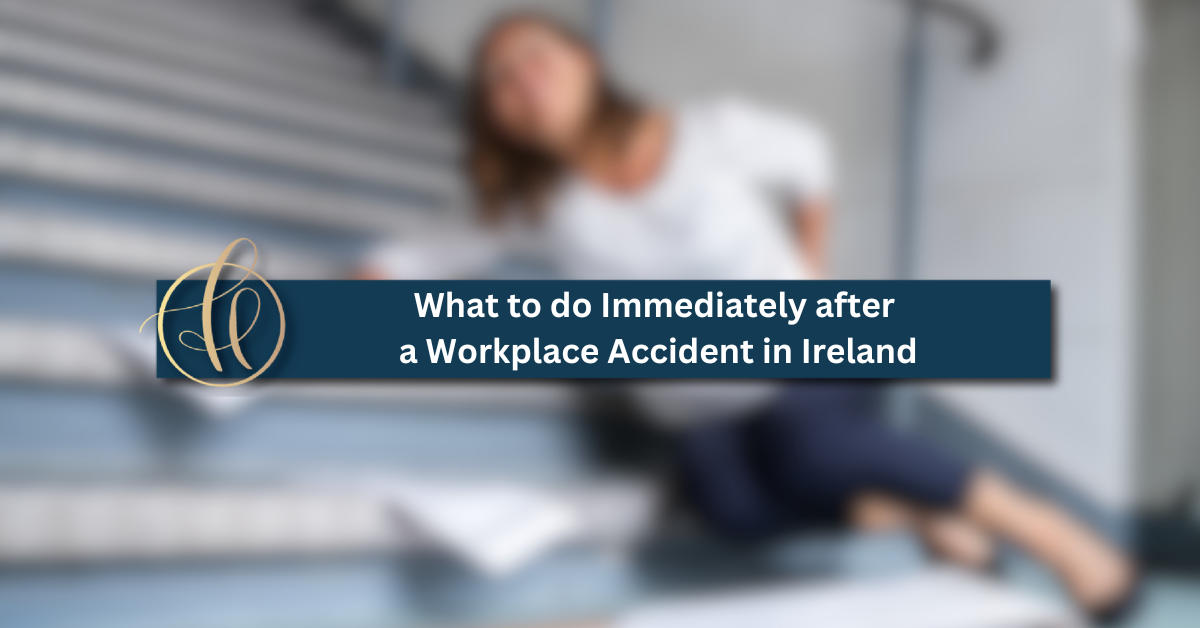Why Immediate Action Matters
Workplace accidents can happen in any environment—from construction sites and warehouses to offices and shops. Whether it’s a slip, a fall, a manual handling injury, or an incident involving machinery, your first steps after workplace accidents can significantly impact your health, recovery, and any potential personal injury claim.
At Martin A. Harvey & Co. Solicitors, we’ve helped countless employees across Cork and beyond secure compensation for injuries suffered from Workplace accidents. If you’ve just had a workplace accident or want to be prepared, this guide outlines exactly what to do, step by step.
Step 1: Prioritise Your Health and Safety
Your immediate priority is to get medical attention. Even if the injury appears minor, some symptoms—like internal injuries, concussions, or soft tissue damage—might not appear right away.
What to Do:
- If seriously injured, seek emergency medical assistance immediately.
- If the injury is less severe, visit your GP or local A&E as soon as possible.
- Ask for a written medical report or doctor’s note. This will serve as essential evidence later.
Why it matters: Medical documentation is the foundation of any workplace injury claim. Without it, proving the severity and cause of your injury becomes more difficult.
Step 2: Report the Accident to Your Employer
Under Irish law, you must report any workplace injury to your employer or supervisor as soon as possible. Failure to do so could weaken your claim or cause delays in receiving support.
What to Do:
- Notify your manager, HR department, or safety officer.
- Ensure the incident is officially logged in the company’s accident report book.
- Request a copy of the accident report for your own records.
Why it matters: An official record provides time-stamped proof that the accident occurred and outlines the basic facts, which can support your version of events.
Step 3: Gather Evidence at the Scene
If you are able to do so (or a colleague can assist), gather as much evidence as possible before the scene is cleaned or altered. This can be incredibly helpful for establishing fault or negligence.
What to Capture:
- Photos or videos of the area, any equipment involved, and the hazard that caused the injury.
- Names and contact details of witnesses who saw the accident.
- Notes on conditions at the time (wet floors, poor lighting, lack of signage, etc.).
Why it matters: Evidence captured immediately after the accident can support your claim and show what went wrong—especially if your employer denies responsibility later.
Step 4: Document Everything
Keep a personal record of everything related to your injury from the moment it happens. This includes pain levels, treatments, and how your daily life is affected.
Keep Track Of:
- Your symptoms and how they develop over time.
- Dates of medical appointments and treatments.
- Time missed from work and loss of income.
- Any expenses (transport to medical appointments, medication, physio, etc.).
Why it matters: The more detailed your records, the easier it is for your solicitor to build a strong case and ensure all damages—financial and non-financial—are considered in your claim.
Step 5: Know Your Rights as an Employee
Under the Safety, Health and Welfare at Work Act 2005, your employer has a legal obligation to provide a safe working environment. If your injury occurred because your employer failed in this duty—whether due to lack of training, faulty equipment, unsafe conditions, or negligence—you may be entitled to compensation.
Your Rights Include:
- Working in a safe environment.
- Receiving appropriate training and equipment.
- Reporting concerns without fear of retaliation.
- Pursuing a personal injury claim if you are injured due to negligence.
Why it matters: Understanding your rights empowers you to take the next step without hesitation or fear of negative consequences.
Step 6: Seek Legal Advice Before Making a Claim
Even if your employer seems cooperative, it’s always wise to speak with an experienced personal injury solicitor before submitting a claim or signing any documents.
At Martin A. Harvey & Co., we’ll:
- Review your case and advise you on its strength.
- Help you submit your claim through the Personal Injuries Assessment Board (PIAB).
- Negotiate with your employer’s insurer.
- Represent you in court if necessary.
Why it matters: Employers and insurers may try to minimise payouts or deny responsibility. A solicitor ensures your rights are protected and that you receive the compensation you deserve.
Step 7: File Your Personal Injury Claim
In Ireland, most personal injury claims must first go through PIAB (the Personal Injuries Assessment Board). You must submit your application within two years from the date of the accident.
Filing a PIAB Claim:
- Your solicitor will help complete the application.
- You’ll need medical reports, the accident report, and any supporting evidence.
- PIAB will assess your claim and may make a compensation recommendation.
- If accepted by both parties, the matter ends. If not, you may proceed to court.
Why it matters: Time limits are strict. Delaying your claim could mean losing your right to seek compensation altogether.
Conclusion: Be Proactive, Be Protected
Workplace accidents can be physically and emotionally overwhelming. But by following the right steps—from seeking medical care to reporting the incident and consulting a solicitor—you can protect your health, your rights, and your future.
At Martin A. Harvey & Co., we’re here to support you through every step of your claim. If you’ve been injured at work, don’t wait. Get in touch with us today for clear, confidential advice.
Contact us now and let’s discuss your next move.
+353-(0)21-4963400
maharvey@martinharvey.ie

